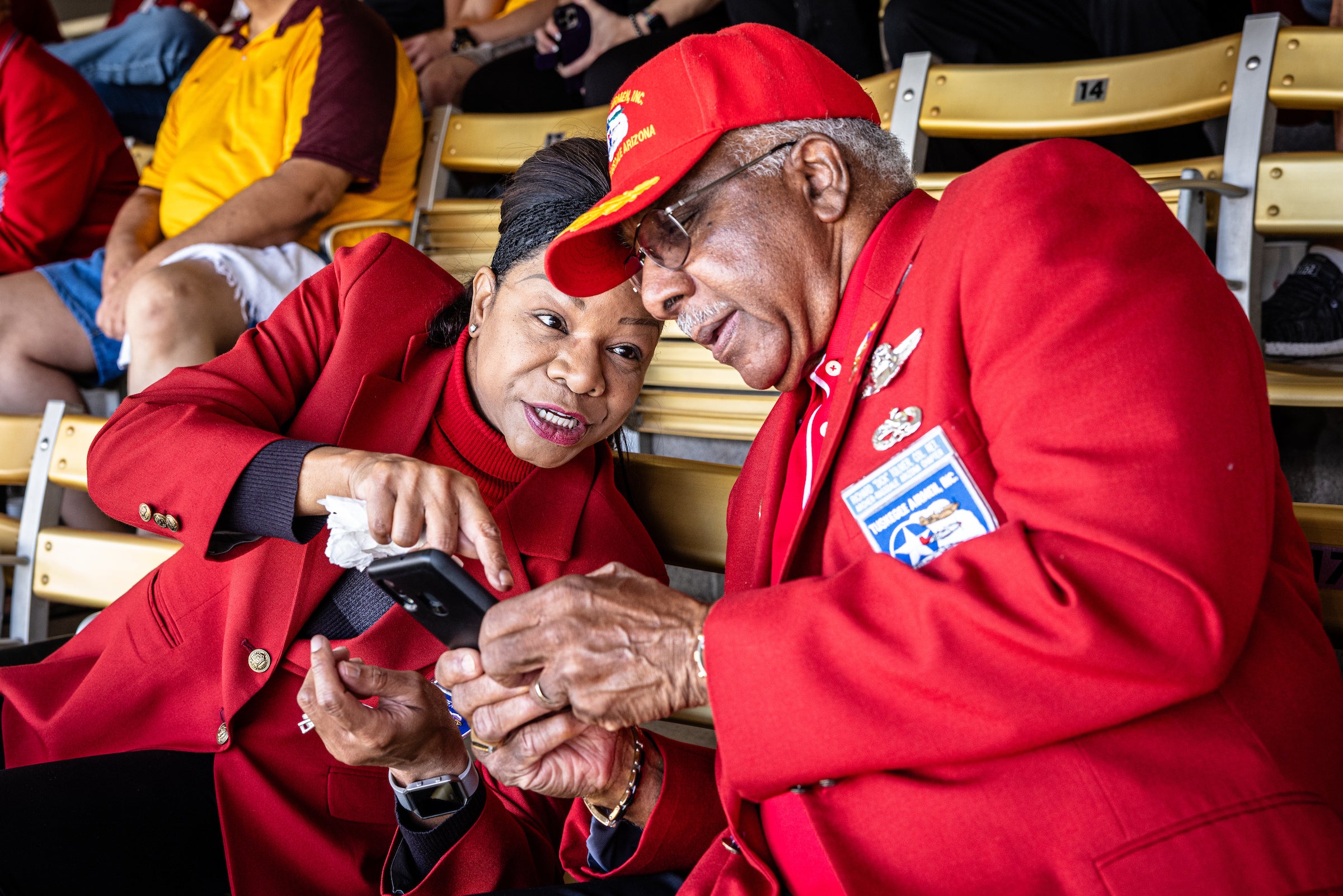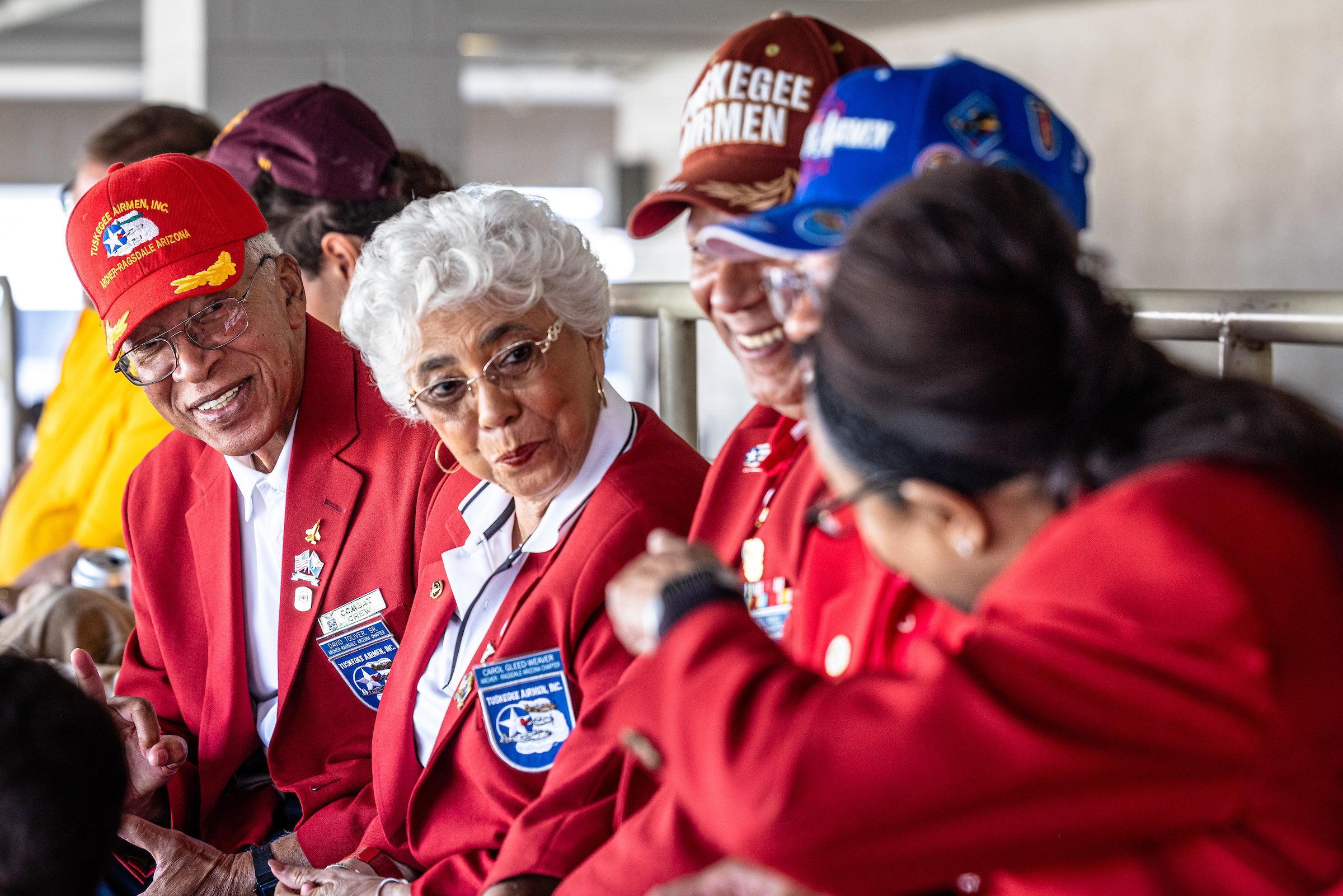Giving wings to a new generation

Air Force veteran Ron Hilliard (center) talks with retired Air Force Col. Dick Toliver (right) during the ASU vs. University of Oregon football game on Saturday, Nov. 18. Members of the Archer-Ragsdale Arizona Chapter of the Tuskegee Airmen were honored during a timeout at the football game, which capped off the university’s 2023 “Salute to Service” campaign. Some of the chapter’s members served as Air Force pilots after training by original WWII Tuskegee Airmen; others served in support services or were family members. Photo by Charlie Leight/ASU News
Editor’s note: This story is featured in the 2023 year in review.
Retired Air Force Col. Richard "Dick" Toliver says it’s an honor to take a bow on behalf of the Tuskegee Airmen and has spent a good portion of his life keeping their legacy alive.
The former pilot and an inductee of the Arizona Veterans Hall of Fame Society was trained, educated and mentored by original Tuskegee Airmen — the first African American aviators in the U.S. military — and flew more than 450 missions in Vietnam. Now, he and others are offering the benefits of what they learned from legendary aviators to future generations.
“It’s an honor to stand up and receive the applause because we are taking the applause for every brother and sister that paved the way for us,” said Toliver, who graduated from Tuskegee Institute in 1963 and is a Tuskegee Airmen protégé, was trained by several of the original pilots and served under Gen. Daniel "Chappie" James Jr. “We also stand up to honor those who can no longer stand up. We also stand because the road that was traveled before us was paved with the blood, sweat and tears of brave men and women. So, we stand, take the applause and salute the flag in their honor.”
Toliver was one of 10 members of the Archer-Ragsdale Arizona Chapter of the Tuskegee Airmen recognized during a timeout at the Nov. 18 Arizona State University football game, which capped off the university’s 2023 “Salute to Service” campaign.
They were invited to attend by Wanda Wright, director of the Office for Veteran and Military Academic Engagement and retired Air Force colonel.
“As a founding member of the Archer-Ragsdale Arizona Chapter of the Tuskegee Airmen, I decided to commit myself to the legacy of these African American aviators,” said Wright, who wore a red blazer in tribute to the Tuskegee Airmen, nicknamed the Red Tails because of the distinctive deep red tail markings on their fighter planes. “These airmen are a testament to courage, resilience and the triumph of skill over adversity. Their legacy is a beacon of inspiration, reminding us that in the face of discrimination, these trailblazing aviators soared to new heights, not only in the skies but also in the annals of history.”
Goya Johnson, who served in the Air Force Reserves for 33 years, talks with retired Col. Dick Toliver, who trained under the original Tuskegee Airmen, at the Nov. 18 ASU football game at Mountain America Stadium in Tempe. Many in the group wore red blazers in tribute to the Tuskegee Airmen, nicknamed the Red Tails because of the distinctive red tail markings on their fighter planes. Photo by Charlie Leight/ASU News
Integration and desegregation
More than eight decades ago, as World War II raged in both Europe and the Pacific, the United States military was still segregated. African Americans were denied the opportunity to play a meaningful part in the nation’s defense.
According to Toliver, it took an enormous effort by Black leaders, the NAACP, the National Urban League, the Black media and a few brave members of Congress to pass laws to allow African Americans to train in aviation to fight abroad. The Tuskegee Institute (now Tuskegee University) in Alabama was given priority status in 1940 and was contracted by the U.S. Army Air Forces in early 1941 to train African American pilots. The institute would go on to provide both flying and ground instruction to more than 15,000 men.
“These men taught me some of the most powerful lessons of my life, and sat down and counseled me for real life,” said Toliver, who was mentored by William A. Campbell, Hubert L. “Hooks” Jones and Lawrence E. Roberts, father of news broadcaster Robin Roberts. “These men made an investment in me and others to prepare us for the real world we were facing in those days. There was this attitude that I would not fail, I must not fail and I must succeed.”
Toliver’s younger brother, David, said the same men at Tuskegee Institute also had a major impact on his life.
“I remember my first ROTC meeting when these men came out. You could tell they were very special,” said David Toliver, who served 12 years active duty in the Air Force and retired as a Department of Defense employee. “They marched out with crisp shirts, creased pants and shoes shined. They had great knowledge and experience, and told us that life wasn’t necessarily fair, so get over it.”
Tuskegee graduated approximately 1,000 pilots, 450 of them serving overseas in five fighting squadrons. They flew over 15,000 missions and destroyed or damaged more than 400 enemy aircraft, destroyed more than 1,000 military targets and even sunk an enemy destroyer. Sixty-six Tuskegee aviators were killed in action while 32 others spent time as prisoners of war. In all, the Tuskegee Airmen earned eight Purple Hearts, 14 Bronze Stars, three Distinguished Unit Citations and 96 Distinguished Flying Crosses.
Dick Toliver said the heroics of the Tuskegee Airmen were equally matched by the “Six Triple Eight,” the only all-female, Black unit to serve in Europe during World War II. They were tasked with sorting and routing mail for millions of American service members and civilians and were awarded the Congressional Medal of Honor in 2022. Only a half-dozen of the more than 850 members of the Six Triple Eight are still alive, including Fannie Griffin McClendon, a 103-year-old Tempe resident.
As a result of their combined bravery during the war, President Harry Truman signed an executive order in July 1948, mandating the desegregation of the United States military. That legacy extends to this day with the recent selection of Air Force Gen. Charles Q. Brown Jr. as the 21st chairman of the Joint Chiefs of Staff Colin Powell was the first African American to be named chairman of the Joint Chiefs of Staff, and he served from 1989 to 1993. He also served as a national security advisor and U.S. secretary of state. on Oct. 1, 2023.
Retired Air Force pilot David Toliver (left) and Carol Gleed-Weaver, daughter of an original Tuskegee Airman, chat with other members of the Archer-Ragsdale Arizona Chapter of the Tuskegee Airmen during the Nov. 18 ASU football game. “There’s a pride I have in my dad that’s overwhelming at times,” Gleed-Weaver said. “Their impact just wasn’t on the war or desegregating the military. Those men all went on to become pioneers in their fields, breaking racial barriers in society, holding important community positions.” Photo by Charlie Leight/ASU News
Keeping the legacy alive
While their sacrifice has been recognized by medals, movies and popular media, the Tuskegee Airmen’s legacy is also being kept alive through 55 chapters nationwide. Members include retired service members, community members and descendants of the legendary aviators, like Nate Carr and Carol Gleed-Weaver.
“My dad never talked about the war until 1972 when I was at Michigan State and he was in Detroit for a Tuskegee Airmen reunion,” said Nate Carr Jr., whose father, Nathanial, was educated at Tuskegee Institute and served as a maintenance officer for the Boeing B-17 Flying Fortress. “It was the funniest thing I’d ever seen because these guys hadn’t seen each other since the war. They talked about things I’d never heard before.”
Carr said because of that reunion, they formed the Tuskegee Airmen Inc., a nonprofit group that honors the accomplishments and perpetuates the history of Black people who participated in air crew, ground crew and operations support training in the Army Air Forces during WWII.
That’s why Carol Gleed-Weaver is involved in the Arizona chapter, which was officially incorporated on Dec. 11, 2005. Her father, Air Force Col. Edward C. Gleed, flew under the 332nd fighter group under Gen. Ben Davis, who was the commander of the Tuskegee Airmen during WWII.
“There’s a pride I have in my dad that’s overwhelming at times,” said Gleed-Weaver, who is a member of the National Heritage Committee and chairs the Arizona chapter’s heritage committee. “Their impact just wasn’t on the war or desegregating the military. Those men all went on to become pioneers in their fields, breaking racial barriers in society, holding important community positions.”
Dick Toliver said the Arizona chapter pays forward the lessons he learned from the original Tuskegee Airmen by preserving, honoring and promoting their legacy and accomplishments in education, military aviation and self-determination through youth outreach programs and scholarships.
Their instruction, however, must strike a chord with today’s youth, said David Toliver.
“The first thing we must do is overcome their objection to being in a classroom,” Toliver said. “So how do we overcome that objection and get their attention? Learning ought to be fun, which is our motto. We must be smart enough to recognize that once we get their attention, we must keep it.”
And hopefully, said Dick Toliver, some of these young people might learn another lesson he commonly dispenses.
“History makes you smart,” Toliver said, “but heritage makes you proud.”
More Arts, humanities and education
AI literacy course prepares ASU students to set cultural norms for new technology
As the use of artificial intelligence spreads rapidly to every discipline at Arizona State University, it’s essential for students to understand how to ethically wield this powerful technology.Lance…

Grand Canyon National Park superintendent visits ASU, shares about efforts to welcome Indigenous voices back into the park
There are 11 tribes who have historic connections to the land and resources in the Grand Canyon National Park. Sadly, when the park was created, many were forced from those lands, sometimes at…
ASU film professor part of 'Cyberpunk' exhibit at Academy Museum in LA
Arizona State University filmmaker Alex Rivera sees cyberpunk as a perfect vehicle to represent the Latino experience.Cyberpunk is a subgenre of science fiction that explores the intersection of…

